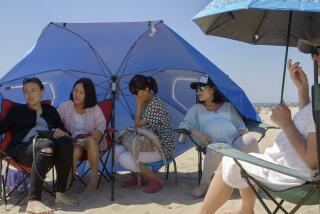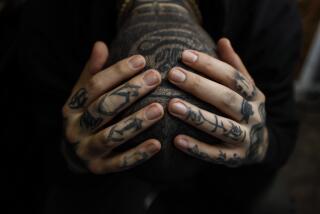‘Here, I am above average’: Chinese ‘parachute kids’ are coming to the U.S. at younger ages

Southwestern School in San Marino has a large populations of young Chinese nationals coming to attend school in the U.S.
Before she came to the U.S. for high school, Yuhan “Coco” Yang remembers wanting to “fly away” from her life in China, where school began at the crack of dawn and lasted until the sky went dark.
She cried a lot her first few days at a private Catholic high school in Pomona, missing family back in China. But at least she had freedom to be herself. She could go shopping, watch TV and meet friends at restaurants and teahouses in the vast, Chinese-speaking suburbs of the San Gabriel Valley.
For the record:
11:00 a.m. Nov. 21, 2016This story was changed to correct the name and location of the California Institution for Women, which is in Chino.
Her grades were decent, but the lessons America was supposed to teach her, she didn’t learn until she was in prison.
“Life is a course where teachers and parents can’t help, and where there is no choice but you walk by yourself, slowly,” Yang wrote in a letter from the California Institution for Women, a correctional facility in Chino.
Yang and three other Chinese students were arrested last year for a bullying incident and charged with torture, kidnapping and assault. The victim, another Chinese high school student, said they took her to a park in Rowland Heights, stripped her naked, beat her and burned her with cigarettes. The dispute, according to acquaintances, was sparked by an unpaid dinner bill and regional rivalries. Yang used high-heeled shoes for the beating.
Now she is 19 and she has nine years left in her sentence. She doesn’t want to make excuses for what she did, she told The Times in an interview. Being alone in the U.S. put her in what she would only call a strange mind-set. She expressed herself “impulsively and stupidly.”
“Obviously, I will never think of doing this again,” she said.
Every year, more students like Yang arrive in American schools, dreaming of a different future than the one China allowed them.
Many say the education they receive in America offers all the support and creative freedom they had hoped for. They consider themselves defectors from the unforgiving Chinese educational system in which, every year, 9 million students vie for just 7 million university seats. About a million of those who are rejected attend colleges overseas. In 2015, 300,000 of those came to the U.S.
Problems of alienation and loneliness have grown, however, as a growing number leave the Chinese system even earlier. In the last decade, the number of Chinese students in U.S. high schools and middle schools has jumped from 1,200 to 52,000. More than a quarter of these students — called “parachute kids” if they come without their family — land in California.
Globalization and rapid wealth creation have put two Chinese traditional values at odds: family and education. Now, more parents are willing to split their families apart and send their children here alone.
“It’s this mind-set of ‘I’m going to do everything and sacrifice for you,’ ” said Yuying Tsong, a professor at Cal State Fullerton who is conducting a study on parachute kids. “Even if it means we must be separated.”
::
At Bill Zhou’s home in Rowland Heights, the clock strikes 7 p.m., trick-or-treaters are ringing the doorbell, and his 17-year-old home-stay student — who asked to be called only by his last name, Hsu — has still not come home from school.
The parents sacrifice a lot, but they may not remember that the child is also sacrificing a lot.
— Yuying Tsong, a professor at Cal State Fullerton who studies parachute kids
As his 6-year-old son cartwheels around the house on a sugar rush, Zhou is getting anxious. He taps out a text. He shifts from the dinner table to the couch, then back again. Finally, he calls, pacing as it rings unanswered.
Most Chinese minors studying in the U.S. live in home-stay arrangements like this: An acquaintance or a friend or stranger found on the Internet agrees to feed, house and care for the students for about $1,000 a month. They form a huge, unregulated industry of parental surrogacy that depends largely on host families to ensure student safety and health.
Parachute kids, separated from their family and culture at a formative age, are more susceptible to isolation, aggression, anxiety, depression and suicide, Tsong said. It’s difficult for home-stay families and schools to reproduce the support students might have had in China. And the pressure on students to make good on their parents’ investment presents even greater challenges.
“The parents sacrifice a lot, but they may not remember that the child is also sacrificing a lot,” Tsong said.
Some kids lose their way, said Hsing-Fang Chang, a Pasadena psychologist who specializes in working with Chinese families who send their kids to study in America.
“Teenagers need to connect and belong to their own community,” Chang said. “They look for popular girls, boys or cliques to connect to. And when they don’t have their family around, this need becomes even more strong.”
A few minutes after 8 p.m., Hsu arrives. He grins at Zhou’s son, takes off his sneakers and dons black and orange Nike sandals. In his room, he opens his binder to the day’s homework — a vocabulary worksheet with words like “reasonable,” “austere” and “genre.” He sheds his Southlands Christian School sweater and changes into a zip-up hoodie, then sits next to Zhou on the couch.
Hsu is a shy 17-year-old with owl-like glasses and long combed hair that falls over his eyes when he laughs. He’s skinny but he doesn’t plan to stay that way — a giant jar of protein powder sits on the shelf above his desk next to a picture of his parents, with whom he texts every day.
I was below average in China. Here, I am above average.
— Hsu, a Chinese student doing a home stay in Rowland Heights
It was his decision to come to the U.S., he said. But then he clarifies that: His father, an executive at a Chinese telecom company, suggested it, and Hsu agreed.
Hsu wants to be a dentist when he grows up. Upon further questioning, he admits that becoming a dentist was his mother’s idea, but he doesn’t have a problem with it.
Someday he wants to go to UCLA, and that was definitely his call. He’s a huge fan of NBA star and former UCLA star Russell Westbrook.
So far, his new life in America consists of school, basketball and computer games. He has been in the country only three months, and someone has already shouted at him to go back to his country, he said. In the mornings at Southlands Christian School, he lowers his head in prayer. More than half of Chinese parachute kids attended private Christian high schools in 2014 — public schools don’t accept many international students and private schools tend to be religious — and although Hsu is not religious, he follows the rules.
They don’t know if the school is good. They don’t know if the home stay is good. But everyone else is doing it so they do it too. It’s reckless.
— Bill Zhou, home-stay parent
America is growing on him. His English is still weak, but he knows all the lyrics to Eminem and Rihanna’s “Love the Way You Lie.” He feels more relaxed. His grades have improved — A’s in everything except some Bs in gym and math.
“I was below average in China,” Hsu said. “Here, I am above average.”
Zhou takes pride in Hsu’s success — he keeps a screenshot of Hsu’s recent report card on his phone and proudly displays it to whoever’s interested.
Both Hsu and his American hosts are from Shenzhen, and Zhou’s wife makes local dishes for dinner each night. Zhou wants to make Hsu feel welcome, but he knows that a fatherly pat on the back only goes so far.
Parents of children as young as 6 years old have responded to his home-stay ad (he won’t take students that young), and he’s worried that many of them don’t know enough about the situations their children are entering. The vast majority use brokers and agents to arrange their children’s education and housing.
“They don’t know if the school is good. They don’t know if the home stay is good. But everyone else is doing it so they do it too,” Zhou said. “It’s reckless.”
::
In Wuhan, China, Allen Qu’s grades were average, and schools traditionally group students by performance as early as middle school. So Qu was placed on a track for average students, a path that would lead to an average university, followed by an average job and an average future.
So one day, his parents told him he was going to America, and he agreed. They dropped him off at a boarding school in San Marino, then went on vacation to New York.
Like many Chinese students, Qu, then 15, came to the U.S. because his grades weren’t high enough to match his family’s ambitions. He and his parents believe that an education in the U.S. will give him better job prospects.
But studies show that rates of employment and compensation for returnees with American degrees in China are lower than those of domestic graduates. In the end, most families choose an American education for the status, or mianzi, that it confers on the family, said Dennis Yang, a researcher who wrote a book about his experiences embedding with several Chinese families deciding to send their kids abroad.
“They all expect their children to be the valedictorian. If they’re unable to get that, going to an American university is a way to compensate,” Yang said.
Qu is now 17, and he’s never discussed mianzi with his parents. He’s not sure what he wants to do when he grows up, though he would like to travel and see the world. But at Southwestern Academy, he has friends, a better grade in math and much less homework. The food at the school smells weird to him, but on weekends he and his friends eat at nearby Chinese restaurants and hit Tea Station for boba.
He video chats with his parents a few times a month. His mother misses him terribly. His father, who runs a construction materials business, is a little more distant, Qu said. Chinese New Year is the loneliest time, he said.
“They don’t really visit,” Qu says. He adds, as if apologizing, that they would come if they had time.
The boarding school, which occupies a lush, secluded property, struggles to engage overseas parents, said Robin Jarchow, a dean.
The school’s student body is now about 86% international students, and more than half of them are from China. International parents are rarely in town, and they and the staff don’t communicate much. The school assigns “dorm parents” to watch over each group of kids, and faculty members sit at every lunch table.
For some students, being separated from their parents allows them to grow in ways that life in China would have denied.
On a recent weekday at the school, in an art room with a 3-D printer, a Chinese international student aspiring to a career as a product designer sketches plans for a wallet that functions as a phone charger. Next door, some Chinese students gather for band practice.
A pink-haired girl from Shanghai plunks out a tune on the piano, working the pedal with gold Vans, while her friend picks up a guitar.
The drummer, another Chinese student, sweeps dyed blue hair away from her face and starts the beat. Another Chinese student takes up the mic.
The tune emerges, shaky, but recognizable: Destiny’s Child’s “Say My Name.”
::
On her daughter’s last day in China, after all the bags were packed and all the school supplies were purchased, Aimee Guo had just one thing left to do, the most important thing.
She drove her daughter, Olivia, to a hair salon in Hangzhou, China.
Chinese belief holds that a haircut can bring good luck, symbolizing transition, a way to shake off the past and leave all the bad luck on the ground next to the old hair.
The haircut was their ritual before every new school semester. But this one was different, Guo said. The past Olivia was leaving behind was a happy childhood in a house full of love in Hangzhou. The future wasn’t just a new semester, but, for Guo, a new life as a long-distance mother to a daughter an ocean away.
There was lots of crying. But Olivia had been dreaming of this since she was a kid.
“I don’t have my own desires for her. I only have one child. I want for her what she wants for herself,” Guo said.
While some of the students arriving in the U.S. are average or poor students, Olivia was at the top of her class, her mother says. Most students arrive without much English ability, but Olivia, 17, is conversant in words like “microcosm” and speaks fluent English in breathless, tumbling stanzas, all delivered with an air of comic angst.
And though many students are forced to come to America by their parents, Olivia had to persuade her parents. Once her grades improved enough, they let her go.
Olivia cried a lot her first few weeks in America. She couldn’t get used to eating her home-stay family’s Mexican food all the time, or how close Americans stood to you when they talked.
But she made friends quickly and began to excel at Fairmont Prep Academy, a private school in Anaheim. Her host family was patient and affectionate. A few weeks in, after a Skype session, her father texted her “wo ai ni” — “I love you” — the first time he had ever said it to her.
She grew more patient, and more mature, and her grades reflected that. She recently took the SATs for the first time over the summer, and it didn’t go well — she described her score as “bad, bad, bad. Like super bad.”
But in a few days, she’ll get something she would have never had in China — a second chance. She’ll take the SAT again and get another opportunity to impress colleges and universities, another shot at achieving her dreams.
To read the article in Spanish, click here
Twitter: @frankshyong
ALSO
Lopez: A hard, personal look at the twilight we’re all headed for, but often unprepared to handle
California’s bullet train authority decides to buy American after all
Investment firm ousts mentally ill and Latino families to flip Koreatown buildings, lawsuit alleges
UPDATES:
11:21 a.m.: This article was updated to correct the statistics for Chinese students in U.S. Christian schools.
More to Read
Start your day right
Sign up for Essential California for news, features and recommendations from the L.A. Times and beyond in your inbox six days a week.
You may occasionally receive promotional content from the Los Angeles Times.







